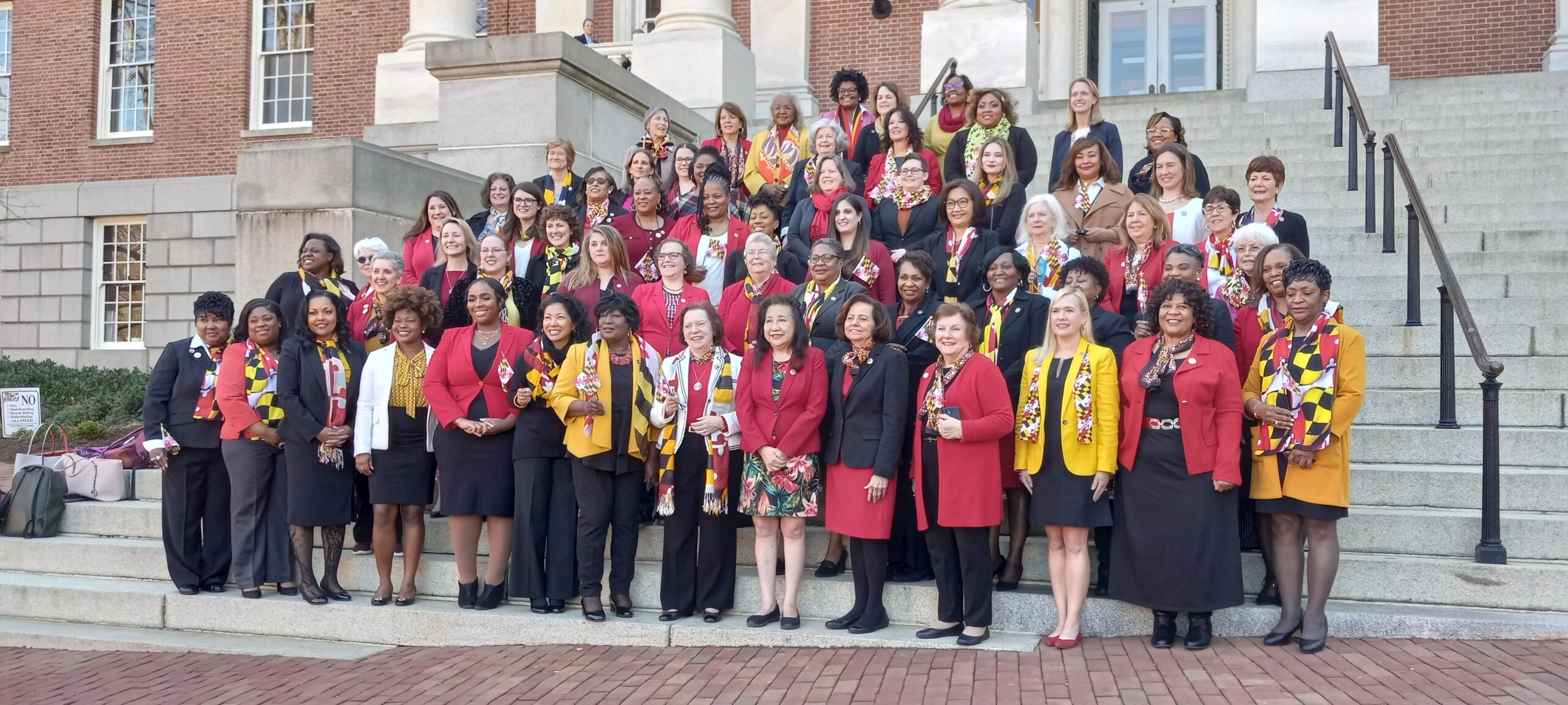Legislative Roundup: Single Abortion Bill Advances in Senate, Hogan Keeps the Money Flowing, Plus Caucus News

Following nearly 2 1/2 hours of debate, the Senate gave preliminary approval Friday to the Abortion Care Access Act, which would allow nurse practitioners, nurse midwives and physician assistants to provide abortion services in Maryland and provide $3.5 million in financial support to clinically train health care professionals to offer reproductive services in the state.
The legislation, sponsored in the Senate by Finance Committee Chair Delores G. Kelley (D-Baltimore County) and in the House by Del. Ariana B. Kelly (D-Montgomery) would also require private insurance plans — barring those with legal or religious exemptions — to cover abortion care without cost-sharing or deductibles and make the state’s existing abortion care coverage under Medicaid permanent.
The drawn-out floor debate mirrored arguments heard in the House earlier this month.
“This is not a debate about abortion being legal,” Sen. Mary Beth Carozza (R-Lower Shore) said Friday afternoon. “This is about deep oppositions about moving Maryland’s already liberal abortion laws to the extremes.”
The bill was initially heard in the Senate Finance Committee.
Before amendments were even offered, Sen. Jason C. Gallion (R-Harford) made a motion to reassign and re-refer Kelley’s bill to the Senate Education, Health and Environmental Affairs Committee, noting that the bill would alter the scope of practice for health professionals — something not normally heard in Kelley’s committee. His motion failed on a vote of 16-30.
Senate Republicans lobbed nine amendments at the bill, including measures that would have required abortion care providers to counsel patients about adoption, require parental notice be provided before the procedure is performed on minors and prohibit Planned Parenthood from serving as the program’s clinical training provider.
All nine amendments were rejected.
Both the House and Senate versions of the bill are expected to receive final approval in the Senate next week.
At the end of the floor debate, Senate President Bill Ferguson (D-Baltimore City) seemed to indicate the bill would be the only abortion rights legislation taken up on the Senate floor this session.
“This was tough. This is a tough issue,” Ferguson said. “Look, this is going to be the only time we take up this issue this session. We’ve got one more day [of debate] left, on Monday. I know there are lots of other possible ideas out there. I think this is the issue that we will take on for this session.”
David Schuhlein, a spokesperson for Ferguson, confirmed Friday night that the Senate will not likely advance a bill from House Speaker Adrienne A. Jones (D-Baltimore County) that would ask voters in a November ballot referendum whether to enshrine the right to abortion access in the state constitution. To get the question to the ballot, the bill must pass the General Assembly by a three-fifths vote.
Schuhlein said that the problem that lawmakers needed to tackle in regard to abortion this session was access, and Jones’ referendum was seen as “a response to the national politics and … what many people will think will happen” when the U.S. Supreme Court issues its ruling on a restrictive Mississippi abortion law later this year.
Hogan introduces supplemental budget
Gov. Lawrence J. Hogan Jr. (R) submitted a $291.7 million supplemental budget on Friday as the governor and lawmakers draw closer to a final budget agreement.
Included in the supplemental spending proposal is $210 million for additional increases for community health care and support services providers. Hogan’s budget initially included a 4% rate increase and the additional funding will bump that figure to nearly 8%.
“Every day, we are inspired by the commitment of our health care and child care providers, and these investments will help further expand access to critical services for Maryland families,” Hogan said in a statement. “We continue to devote part of our record surplus to relief and resources for those in need, including our developmentally disabled community.”
The increase is among several budget changes that legislative committees identified as top priorities earlier this month. After the Bureau of Revenue Estimates projected the state surplus would grow to about $7.5 billion over the next two years, lawmakers moved to “fence off” more than $1 billion in additional spending for the 2023 fiscal year.
Traditionally, when the legislature fences off funding, the governor chooses whether to release that money when the next fiscal year starts on July 1; lawmakers are hoping to reach agreements with the Hogan administration this year that would cement the additional spending before the legislative session ends on April 11.
Other items in Hogan’s supplemental budget include $16 million for child care retention and recruitment bonuses, $15 million for renovations to child care facilities, $3.5 million to support prosecutors’ offices, $6.5 million for the Baltimore Police Department to support warrant apprehension activities, and $35 million to provide additional funds to guard against federal cuts and support the Victims of Crime Act program.
House Appropriations Chair Maggie L. McIntosh (D-Baltimore City) said in an interview that she was pleased that some of the items in the supplemental budget were on the legislative priorities list and that she anticipates another supplemental budget next week.
Ferguson also noted during Friday’s floor session that Hogan was agreeing to some of the legislature’s priorities. “It’s always positive to see continued working together,” he said.
House and Senate budget negotiators are expected to begin meeting Monday to hash out differences between the two chambers’ spending plans.
The deadline for both chambers to pass a budget bill is April 4.
Black Caucus elects officers
Del. Darryl Barnes (D-Prince George’s) was re-elected chair of the Legislative Black Caucus this week, meaning he’ll serve in the position for two more years. Barnes, who has served in the House since 2015, has been LBC chair since 2018.
Elected along with Barnes: Del. Jheanelle Wilkins (D-Montgomery) as first vice chair; Del. Melissa Wells (D-Baltimore City) as second vice chair; Del. Rachel Jones (D-Calvert) as secretary; Del. Benjamin T. Brooks (D-Baltimore County) as treasurer; and Del. Carl Jackson (D-Baltimore County) as financial secretary.
“The 2022-2024 executive team represents diversity across districts, gender, and age,” Barnes said in a statement. “I am honored to continue as chair of this dynamic caucus that includes 61 members who work exceptionally hard to promote effective and responsible agendas.”
Barnes then appointed Del. Stephanie Smith (D-Baltimore City) as the caucus parliamentarian; Sen. Joanne C. Benson (D-Prince George’s) as chaplain; and Sen. Mary L. Washington (D-Baltimore City) as historian.
Some caucus elections are contentious, but by all accounts this one was pretty harmonious.
Women’s Caucus comes together — sort of
A little over a week after the 11 Republican members of the 82-strong Women’s Caucus of Maryland resigned in protest over the latest caucus election results, dozens of women lawmakers posed together on the State House steps for a long-scheduled Maryland Day photo shoot. Even though they have resigned from the caucus, three Republicans showed up: Carozza, Sen. Adelaide C. Eckardt (R-Middle Shore) and Del. Susan K. McComas (R-Harford).
Carozza said she decided to appear because she’s belonged to the caucus for eight years and wanted to honor the outgoing leadership; her beef, she said, is with the incoming leadership, who broke with tradition by leapfrogging a Democratic lawmaker into the presidency over a Republican who was next in line.
“I am taking a pause from the Women’s Caucus under the new leadership,” Carozza said.
The Republicans resigned from the caucus after the vote last week to install Del. Lesley J. Lopez (D-Montgomery) as the new president over Del. Lauren C. Arikan (R-Harford). Arikan had been the vice president and was next in line to become president; Lopez was first vice president and was supposed to have taken over after the 2023 legislative session.
Del. Anne Healey (D-Prince George’s), the outgoing caucus president whose term ends next month, at the end of this legislative session, said she’s hopeful that the caucus can come together. The former Republican members of the caucus, she said, are keeping their promises and appearing in videos to mark the group’s 50th anniversary, and peace talks are ongoing.
“I think it’s mixed,” Healey said when asked about the state of the caucus. “I think there are some people who are very dug in. There are some people who are sad about it. There are some people who would like it to come back together and I think eventually it will.”






 Creative Commons Attribution
Creative Commons Attribution